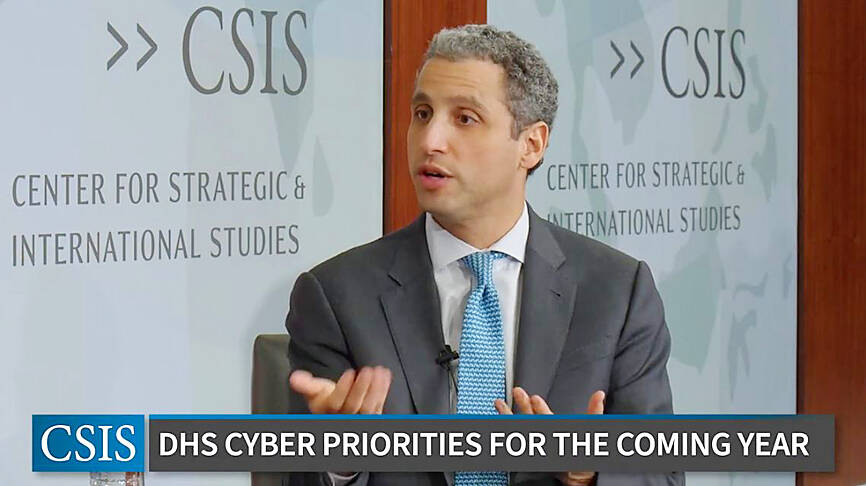US Undersecretary of Homeland Security for Strategy, Policy and Plans Robert Silvers on Friday warned of the risks that using Chinese telecommunications equipment could have on global infrastructure.
At an event hosted by the Washington-based Center for Strategic and International Studies think tank on the topic of cybersecurity, Silvers said he and other US officials were urging other countries to avoid using Chinese telecommunications equipment, to prevent introducing information security risks.
“It may be that the Chinese-controlled technology is the cheapest available, but it may also be that that’s not the final bill to arrive,” he said. “What happens five years, 10 years down the road when the government of the People’s Republic of Society has the ability to pull the rug out from under your entire society?”

Photo: Screen grab from a Center for Strategic and International Studies video
Separately, Mark Montgomery, senior director of the Foundation for the Defense of Democracies’ Center on Cyber and Technology Innovation, was quoted by Voice of America’s Chinese-language Web site on Saturday as saying that the US Department of Defense should assist Taiwan in dealing with cybersecurity challenges.
China would not likely attempt a military landing on Taiwan, but would instead engage in cyberattacks against Taiwan’s key infrastructure, including its power grid, water supply and other systems, he was quoted as saying.
China might also try to use cybertools to destroy Taiwan’s satellite communications, he added.
US assistance would involve researching critical infrastructure, finding vulnerabilities and devising ways to protect against them, he said.
Montgomery was one of the primary authors of a report the foundation published on Friday titled The Attack on America’s Future: Cyber-Enabled Economic Warfare.
The report said the US must work with allies to defend against cyberattacks by aggressive nations.
“Cyberattacks on critical infrastructure could disrupt a U.S. military mobilization in defense of Taiwan or interfere with other military operations by China’s adversaries,” the report said, citing information from James Mulvenon’s book The People’s Liberation Army in the Information Age.
The report said China aims to take control of global information and communications infrastructure.
“Altogether, China has implemented a coherent long-term strategy to control key nodes in the global economy and communications infrastructure — all at the expense of the United States and its allies,” the report said.
Ultimately, China’s aim is to “alter global dynamics to promote its interests while diminishing the influence of the United States and other free-market democracies,” it said, citing Vijay Gokhale’s Foreign Policy article “China is Gnawing at Democracy’s Roots Worldwide”.

OPTIMISTIC: The DGBAS sharply upgraded its GDP growth estimate from 3.54 percent to 7.71 percent after the Taiwan-US trade agreement signing and given AI optimism The US imported more from Taiwan than China for the first time in decades, as US President Donald Trump’s tariffs reshape trade flows while a global boom in artificial intelligence (AI) fuels demand for tech products. US purchases of goods from China plunged almost 44 percent in December last year from 2024 to US$21.1 billion, US Department of Commerce data showed on Thursday. By contrast, shipments from Taiwan more than doubled during the same period to US$24.7 billion. The soaring Taiwanese shipments to the US reflect the huge expansion in supplies of chips and servers for AI companies, which has completely changed

The Central Election Commission has amended election and recall regulations to require elected office candidates to provide proof that they have no Chinese citizenship, a Cabinet report said. The commission on Oct. 29 last year revised the Measures for the Permission of Family-based Residence, Long-term Residence and Settlement of People from the Mainland Area in the Taiwan Area (大陸地區人民在台灣地區依親居留長期居留或定居許可辦法), the Executive Yuan said in a report it submitted to the legislature for review. The revision requires Chinese citizens applying for permanent residency to submit notarial documents showing that they have lost their Chinese household record and have renounced — or have never

US and Chinese fighter jets briefly faced off above waters near the Korean Peninsula this week, Yonhap News agency reported, marking a rare confrontation in that area between the two superpowers. About 10 US fighter jets on Wednesday departed an airbase in Pyeongtaek, South Korea, for drills above international waters off South Korea’s western coast, the news outlet cited unidentified military sources as saying. While the US planes did not enter China’s air defense identification zone, Beijing scrambled planes as they neared that region, the report said. “The Chinese People’s Liberation Army organized naval and air forces to monitor and effectively respond

Taiwan has secured another breakthrough in fruit exports, with jujubes, dragon fruit and lychees approved for shipment to the EU, the Ministry of Agriculture said yesterday. The Animal and Plant Health Inspection Agency on Thursday received formal notification of the approval from the EU, the ministry said, adding that the decision was expected to expand Taiwanese fruit producers’ access to high-end European markets. Taiwan exported 126 tonnes of lychees last year, valued at US$1.48 million, with Japan accounting for 102 tonnes. Other export destinations included New Zealand, Hong Kong, the US and Australia, ministry data showed. Jujube exports totaled 103 tonnes, valued at